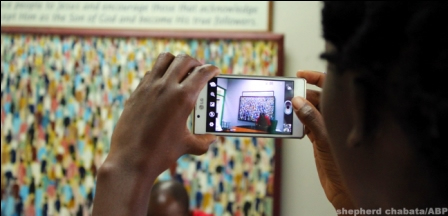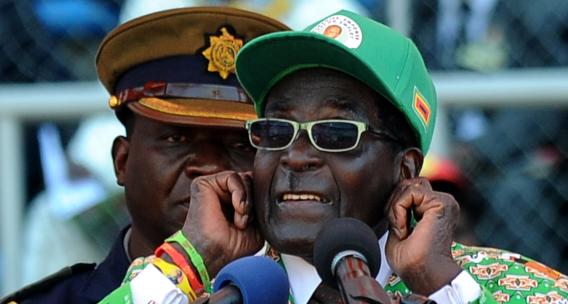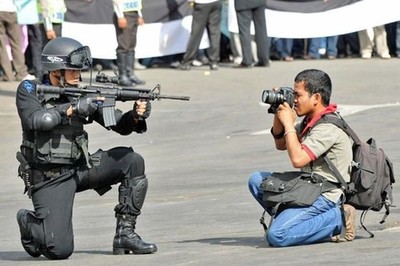Not an easy road for local musicians
Thursday, August 29th, 2013 by Marko PhiriZimbabwean musicians are steeped in the very eager desire to earn a living out of their craft, and rightfully so.
The sprouting of all sorts of backyard recording studios over the past few years points to a shift from music being a craft plied “by others” to something which you and I can do and can actually can put bread on the table.
Yet that approach could just be what has caused them to be ignored: that anyone can make music, never mind good.
The question then is have they succeeded in turning their microphones into money-spinning enterprises? And have they produced music which local listeners and buyers will take seriously beyond patriotism’s sake?
These are some of the questions that emerged from a discussion organized by DefZeem as part of the weekly Food for Thought series at the US Public Affairs section.
On the panel sat Amara Brown, Pauline from the group MaFriq, Tsungi Zvobgo, who manages musicians that include Amara Brown, and then there was a chap who is manager of such successful acts as Knox of “Ndinonyara” fame.
What emerged was a tale of mixed fortunes, as well as mixed interpretation of what “ought to be” and I got the sense that there is no one-size-fits all for local musicians in the context of that while some take the art as a fulltime occupation, some however see it as a diversion from their “chosen careers.”
A few weeks ago, a @263Chat discussion dwelt on Zimbabwean musicians and why they apparently are being ignored by locals, and why Zimbabweans are ever ready consumers of “foreign” music.
It was obviously informed by the same concerns that brought together the musicians who gathered for the Food For Thought discussion under the theme “Making Music, Making Money.”
It was one of those issues about local music where optimistic young artists imagine they can be the next Oliver Mtukudzi, conveniently forgetting the hours and years Tuku put into his craft.
After all, Tuku is the same man who has been panned for such farcical musical offerings (I remember someone pointing and laughing at Chimbambayira chirimpoto) that he himself would rather forget he ever made recalling the gems he now churns out.
Like Tsungi Zvobgo said, for any serious pretender, music is a fulltime career and there are no short cuts to money and fame.
Hard work never killed anybody, but musicians got to take that chance, I would add, recalling that famous Ronald Reagan quip.
After all the young artists are the same folks who will readily recite American hip hop superstar 50 Cent’s “Get rich or Die Trying” but still imagine that there are easy pickings in music.
It was also refreshing to hear Amara Brown say that her dad insisted that she study music, adding that for her, music is a fulltime gig.
Of course not all artists can, or must enroll at some ethnomusicology school or take up music at some prestigious varsity, yet this has indeed helped some navigate that heartbreaking terrain and define their approaches to the trade.
For Jacqueline from MaFriq her approach to music has meant learning more, working more and keeping herself relevant. She has learnt to play the mbira for example, an instrument she says very few young Zimbabweans choose to play (perhaps because they still view it as a “sacred” instrument).
Obviously this means music for her being more than just standing before the mic be it in the booth or on stage, but actually mastering part of the art that defines one as a proper musician.
Of course it has become acceptable that you don’t necessarily have to play any instrument to pass for a musician, but it certainly helps.
Yet because local music is now very much based on one having a PC, iMac and ProTools, the speed with which “music” is being created is astounding.
But the question is who is buying it? Or are they like those connoisseurs of sorts who make music just for the sake it because they
want to keep some folk traditions alive?
As Jacqueline said, while new artists welcomed the 75-percent local content when it was introduced back in the days of the madness of the Ministry of Information, it brought with it a down side; in her words “there was no quality control.”
Anything that could be produced bearing the local production sticker was lekker but obviously for the wrong reasons.
Standards fell and it is no wonder there was an outcry to do away with local nonsense dressed music.
It is of concern – morbidly interesting in fact – that there are masters of the art who died paupers despite selling hundreds of thousands of copies of records in what were then Zimbabwe dollars, and some young artists while not gifted with the same flair, imagine there are easy pickings in music, never mind they cannot strum a clumsy tune on a banjo.
While in the past the masters made great music, they also existed during a time of organized bureaucracies with distribution agreements with big and influential music industry companies.
As an aside perhaps, these are the same industry players many times accused of fleecing these same musicians who broke record sales – literally.
And now because there is a shift where artists imagine making music in their backyards can result in instant riches, no such distribution networks now exists, with Knox’s manager warning against the naivety of imagining that these emerging artists can distribute their own stuff “from the boots of their cars” (not his words mine!).
It was therefore inevitable perhaps that the issue of piracy and why local music is so cheap would come up in such a discussion.
There are no easy solutions, says Tsungi Zvobgo.
What she says she has done with artists under her management is to concentrate on making good music, getting it out to the people for not only a pittance but for free even, giving it out to pirates who fill CBD pavements whom we already know sell CDs for a dollar never mind the quality.
From there, the music is with the people, people know it, and when live shows are held, well, the crowd is not being introduced to something that was made years ago but are hearing it for the first time!
What remains undisputed is that, like Buju Banton sang, “it’s not an easy road,” and anyone who picks up a microphone expecting instant fame could be in for cardiac arrest.












